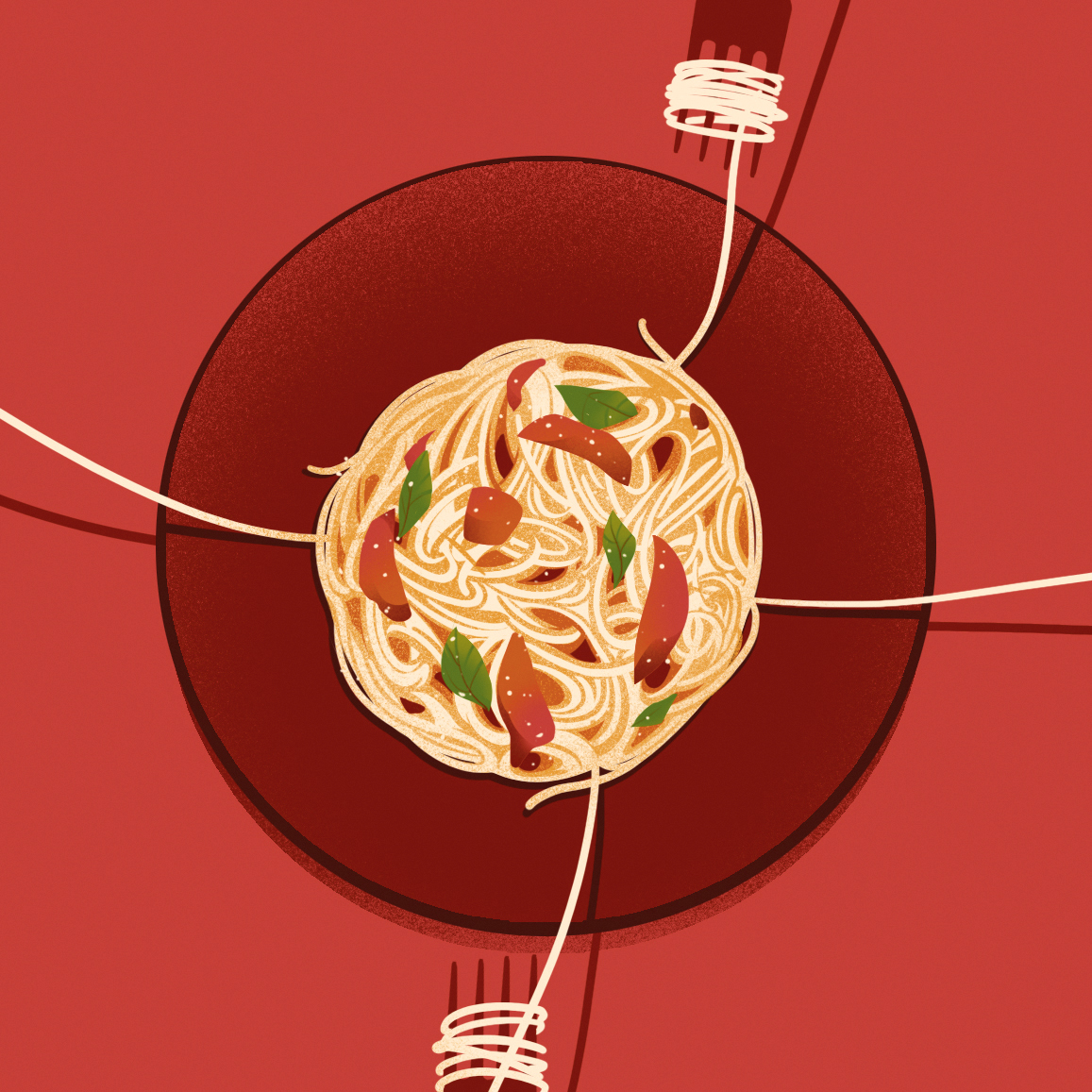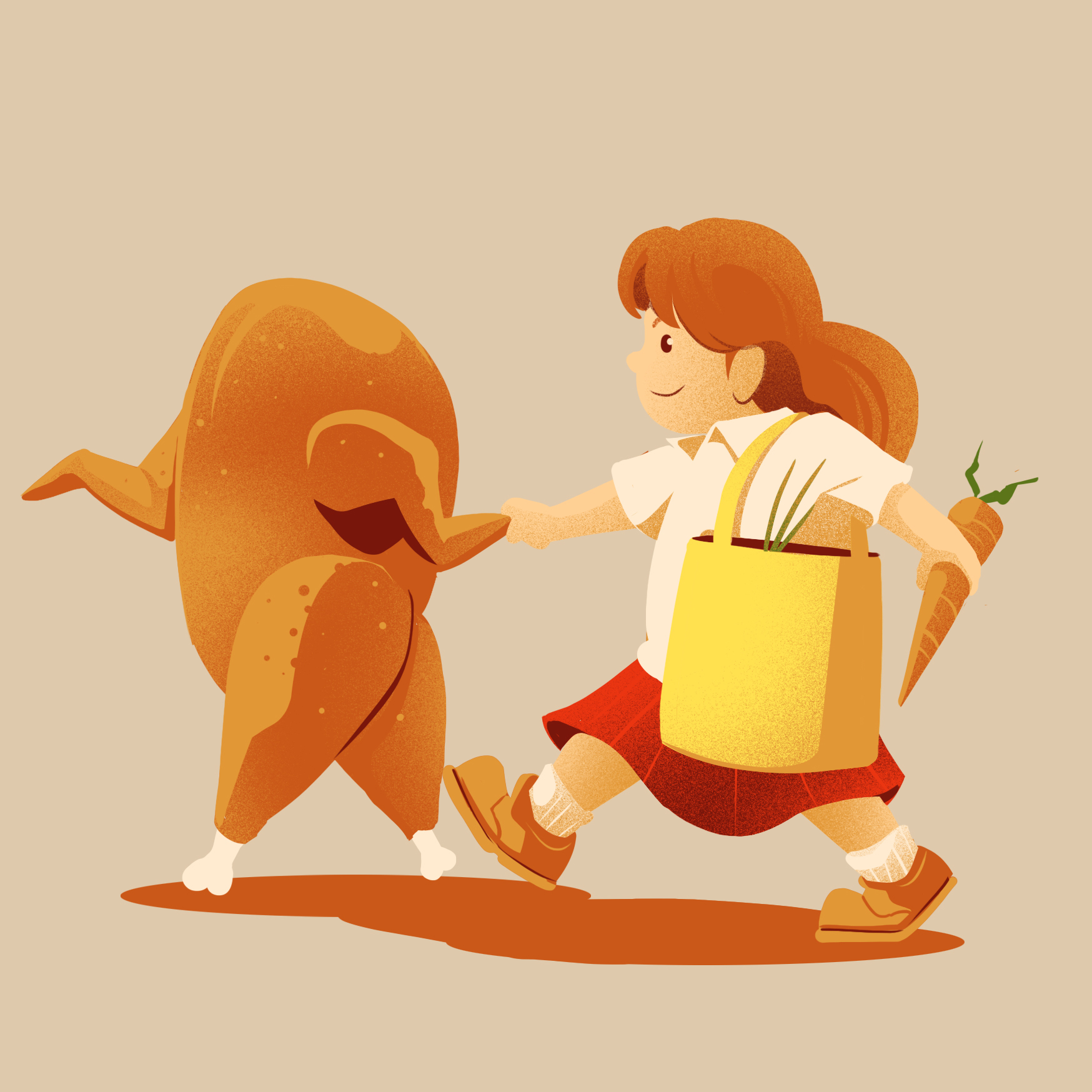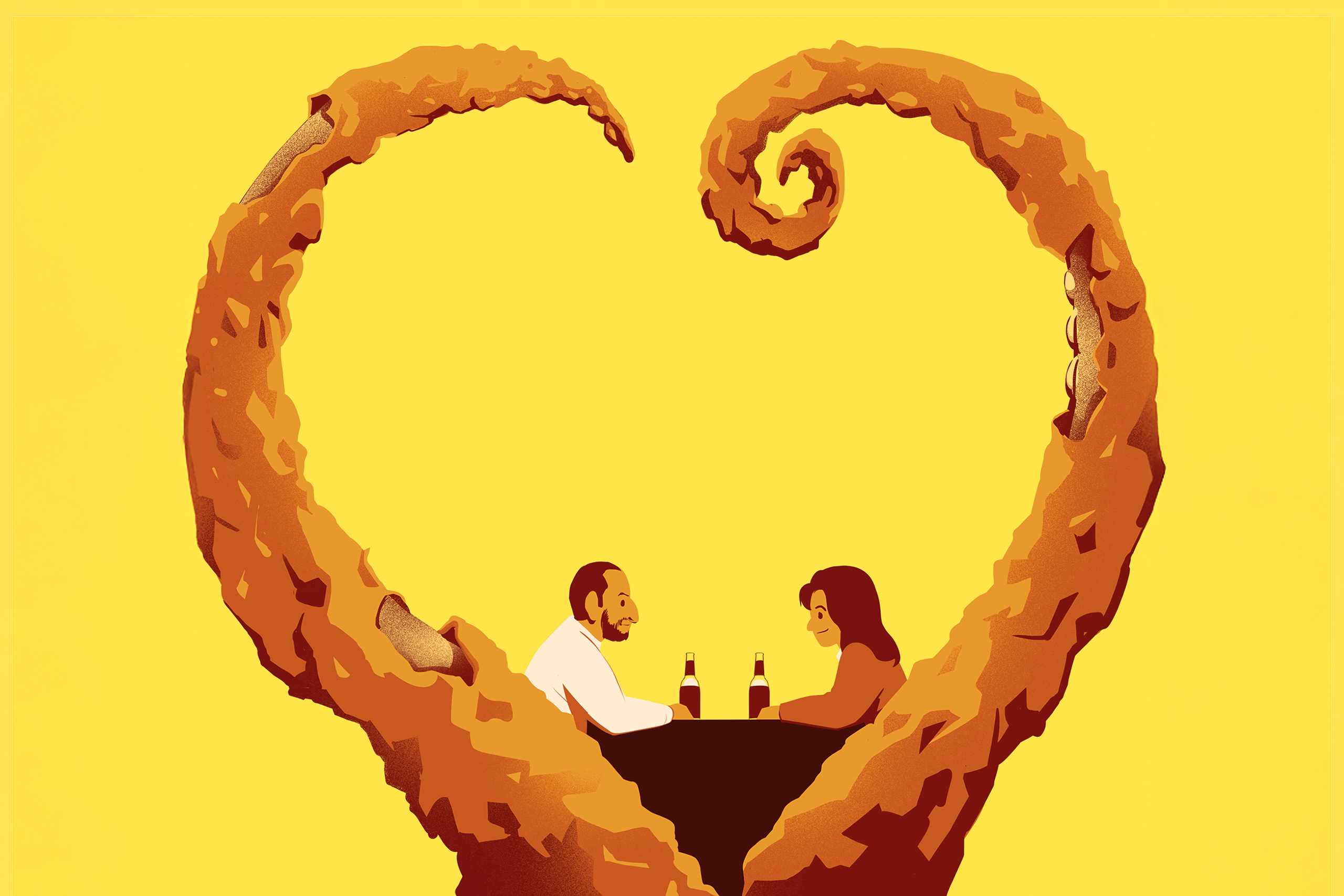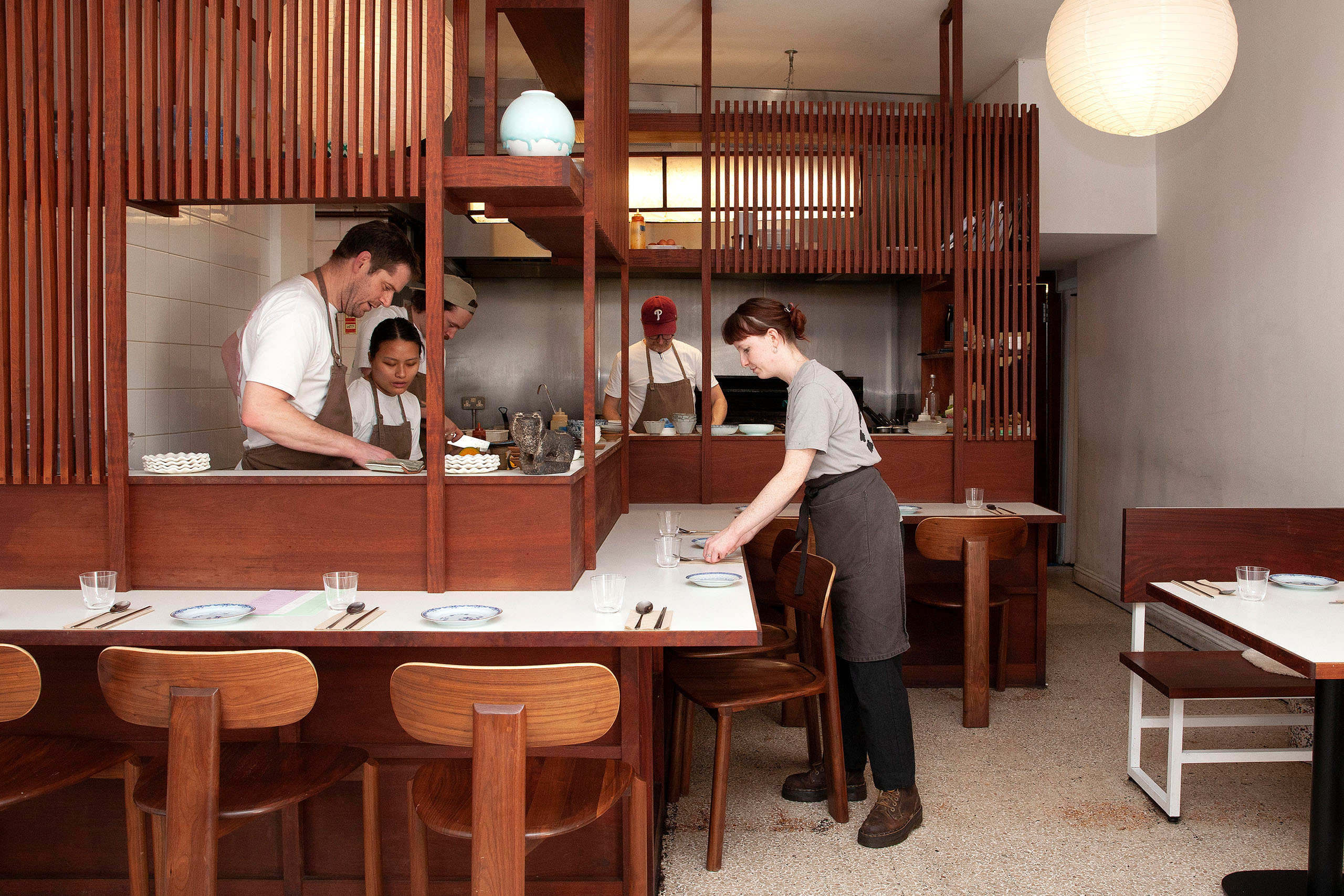Illustrations by Eric Chow
Henry Harris: I found my soulmate over crispy squid
The first time I saw Denise, I was working at Hilaire [Simon Hopkinson’s west London restaurant, which closed in 1995]. I was a sous chef; she’d joined as a waitress. She was American and had been travelling around Europe, and she came down the back staircase with a suntan, bleached blond hair and ballet flats, which were completely unsuitable to working in a restaurant. She slipped and dropped a tray of glasses; I looked up and was captivated. It took me a few months to ask her out, being a shy Englishman, but we went to Poon’s in Chinatown: a brilliant Cantonese restaurant with harsh lighting and Formica tables. I find it difficult not to order crispy squid with garlic and chilli. It puts you in a happy place: hot, crispy, salty, spicy with a residual oil from the chilli that tingles on your lips. I remember sharing this squid, drinking cold Singha beer, talking and listening and thinking, “I couldn’t be happier.” We hadn’t known each other long, but it all clicked into place. She didn’t have long left on her visa, but we spent the rest of that summer together. We got married a year later and we celebrate our 39th anniversary this year. I feel proud and lucky. I found my soulmate – the love of my life – and there was cold beer and piping hot squid.
Henry Harris is co-owner of the Three Compasses and Bouchon Racine, London
Sally Abé: Delia’s fritters set me on the path to becoming a chef
I left home at 18 and I had no idea about cooking. My boyfriend at the time and I were eating badly. My mum gave me Delia’s Vegetarian Collection and the first dish I cooked from it was courgette and potato cakes with mint and feta. I was struck by how very simple ingredients could come together with flour and eggs to make something delicious. I went on to cook most things from that book, and a few years later I was training to be a chef and working at the Savoy. I didn’t think about it again for years – then I started writing my memoir and remembered these fritters that, in a small but profound way, put me on the path towards becoming a chef.
Sally Abé is head of food at the Bull, Charlbury, and author of A Woman’s Place is in the Kitchen
Noor Murad: the fish paste trick that cured me of being picky
I was a picky eater when I was little. For example, I thought fish was gross and refused to eat it. I loved bread, though, and there was this flatbread that my dad’s uncle would serve, which I would always go for, called falazeen, warm and oily, rolled up with this salty spread inside. For years I didn’t know what the spread was. One Friday evening, in his garden in Bahrain, which is green and full of fruit, I was eating this bread, and my dad’s uncle asked if I liked it. I said, sure I like it. My mum looked so smug. The spread was mehyawa: a pungent fish paste typical to Bahrain, which they make by grinding sardines into a powder with spices and flax seeds, and fermenting the mix for five days in the sun. I basically had an identity crisis: if I liked fermented fish, what else did I like? I started to tune in to flavour and texture and multiple layers of food. The best food is the food that surprises – and that memory, the background noise of food, also matters. I wonder if all parents do that to their children. I think they do. I think one day, I’ll do it too.
Noor Murad is the author of Lugma: Abundant Dishes and Stories from My Middle East (Quadrille, £28)

Stevie Martin: Spaghetti pomodoro taught me that food should be sociable
The first time I realised my struggles with irritable bowel syndrome were not normal was when I went to Pisa with my now husband. I had cut out gluten and dairy a few years before, in an effort to manage the condition, but was still occasionally eating the odd bit of wheat, then paying the price. In Pisa, I went to such lengths to hide my extreme reaction to pasta from him that, at night, I’d go to the loo in the hotel lobby on the pretence I just liked hanging out there. At one point he asked if I was drinking alone. When lockdown hit and everyone else was taking up a new skill, I decided to slowly reintroduce gluten into my diet, starting with sourdough. No one was seeing me except my husband – he bore the consequences – and over the next 18 months I successfully trained myself to digest bread.
When the world opened up in 2022, I wanted to test my new skill – so in Venice with my sister, I ordered a spaghetti pomodoro. I grated on some vegan cheese and it was delicious – but when I felt no pain, it was like the world had been unlocked. It is so isolating, having a food allergy. It’s a small thing, but it’s very primal, breaking bread with people, or being able to share a birthday cake. That spaghetti pomodoro changed my life because I could finally eat pasta without consequences – and it also reminded me that food is a sociable, joyful thing to share.
Stevie Martin is a comedian. She is on tour later this year; steviemartin.com
Newsletters
Choose the newsletters you want to receive
View more
For information about how The Observer protects your data, read our Privacy Policy
Nish Kumar: homemade curry helped me to understand my grandmother
Everybody says their grandmothers are fantastic cooks but mine was an artist. When I was 16 years old, we were in Australia for my uncle’s wedding and she made Malabar fish curry, from the region of Kerala where she grew up. She had access to fresh fish in a way that she didn’t in Croydon. It was unbelievable: layers upon layers of flavour. First the coconut, then the spice, then this fish that was so fresh.
I have a memory of me and my uncle mopping up the remainder with bread, certain she had made something historic. Before then, it was as if I’d been watching Monet with felt-tip pens but now the artist had been given watercolours, and she had run amok.
You realise as you get older that your grandparents had whole lives that didn’t involve you. My grandmother was born a British subject in India, listening to the BBC World Service on her neighbour’s radio, and she has lived long enough to have an iPad to speak to her grandchildren in Australia. She was educated, she spoke five languages, but like a lot of women of that generation she got married and had kids young. There were a lot of things she could have been, had circumstances been different. There were untapped depths in this woman, and it was all there in that mouthful of fish curry.
Nish Kumar is on tour now. For tickets, visit nishkumar.co.uk
Chris van Tulleken: the hot wings kicked off my campaign against ultra-processed food
Hot chicken wings had always been my favourite, ever since the first time I tried them, which was probably on the way home from school with my brothers. This significant mouthful was in autumn 2020, when I had just got off a phone call with an incredible scientist in Brazil called Fernanda Rauber. We had been talking about her research into ultra-processed food (UPF), and every time I had said “food”, she corrected me, saying, “It’s not food, Chris, it’s an industrially processed edible substance.”
I finished the call and sat down to eat my hot wings but I couldn’t finish them. Rauber had managed to flick this switch in my brain, and I could no longer see them as food. It was that phone call that led to the book, the podcast, the television programme and all of my research into ultra-processed food. But it was also emblematic of the way this small group of scientists are changing the conversations we are now having about UPF. Rauber is part of a research group at the University of Sao Paulo which has seen the problems of diet-related disease happen in Brazil, when these “foods” arrived, and has been brave enough to see food as something with social, political and economic meaning. That call forced me to reconnect with real food. And the trick Rauber pulled on me is the trick I want to pull on everyone else.
Chris van Tulleken is the author of Ultra-Processed People (Cornerstone, £10.99)

Poppy O’Toole: the roast that gave me a sense of control
Everything was a bit chaotic for me growing up, and I spent a lot of time at my nan’s. She would take me to markets and, once, when I was six years old, we were at the butcher’s counter and I saw this poussin and thought, “This chicken is me sized.” I said to my nana, “I need to eat this chicken,” and she bought it. I ran around the supermarket, going feral, getting carrots, potatoes – anything miniature I could find for dinner. On Sunday, she helped me cook it all – and I realised food was something you could have ownership of. You can make it whatever you want it to be. I was only young at the time, but I realised food was a thing through which I could explore the world and be in control.
Poppy O’Toole is the author of The Potato Book (Bloomsbury, £22)
Fadi Kattan: an oyster made me feel I belonged
I have tasted oysters in Dibba Bay in Dubai, and I grew up visiting France with my parents and grandparents and eating oysters. But the oyster that ranks as life-changing is one I had last year in Ireland, after speaking at a festival called Food on the Edge.
Jp McMahon, who is a fantastic chef, had invited me to speak about Palestinian cuisine, and it was emotional because it had been a particularly tough few days in Palestine. On the last day we went to Killary Fjord, to a place where they grow mussels and shuck oysters. I got off the bus and the first thing I saw was a huge Palestinian flag, and the owner, Kate, who greeted me wearing a kufiya. There was a wood fire where some of the chefs from the festival were grilling local “giga”oysters – and if there is one thing I hate, it is a cooked oyster. So I had a fresh oyster that had been collected from the sea hours previously. It was exceptional – crunchy and fresh.
Having great people there who were supportive didn’t make things easier; it is not easier, but their support felt real. And this oyster reinforced the sense that I belonged to this place, this moment, these people. It wasn’t just food; it was hope, nostalgia – and it made sense.
Fadi Kattan is chef and co-founder of Akub, London
Bee Wilson: the 50th birthday cake that showed me a new happy-ever-after
Days after my husband left, the heart-shaped tin in which I’d baked our wedding cake fell to the floor. It felt ominous because I had always planned on using it for our 25th wedding anniversary. I knew I had to find new associations, but for a long time I didn’t know how.
I wrote a book, prompted by the tin, about the kitchen objects we hold on to and why they matter. I interviewed people about their best china, their antiquarian cookbook, their tomato-shaped salt shaker. I found people’s objects related to their mothers. As I was nearing the end of this book, my 50th birthday was approaching – and I knew what to do with this tin.
I made myself the birthday cake I had baked for all my three children. There was something healing about using this tin for a new celebration – but sharing it with my children who, if it wasn’t for my wedding, wouldn’t have been there. I had thought that heart-shaped tin was about a romantic happily ever after – but you can be happy after separation. I thought I would use it for an anniversary cake, yet nothing made me happier than the cake I made in the end. And when I sat down to eat it, the person I missed wasn’t actually my ex-husband; it was the person who first taught me how to make cakes – my mum. OFM
Bee Wilson is the author of The Heart-Shaped Tin (Fourth Estate, £18.99)


